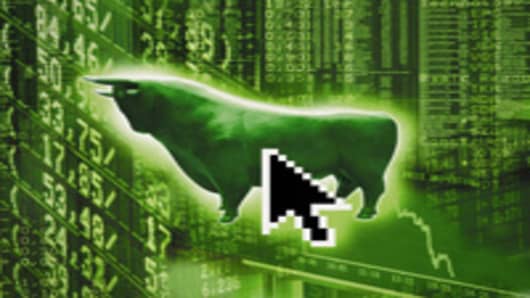A positive first fortnight’s return to trading should lead to a positive year for the U.S. markets in 2012, Dennis Gartman, author of The Gartman Letter, believes.
Trading on the Dow Jones Industrial Average
has started the year on a positive note, after a tumultuous 2011.
“If we finish the first two weeks higher, we will finish the year higher,” Gartman told CNBC Wednesday.
“Let’s not get too excited over the first few days of trading,” he cautioned. “If we’re higher after two weeks, that will set the tone for a much better year.”
Gartman described himself as “bullish on equities,” after improved economic data from the U.S. in recent weeks.
He added that he has changed his mind about gold after selling off the metal last month.
Gartman said he would buy gold on any slight weakness in the price.
“I will never buy a falling knife but if there is a move sideways for a week or so, I will be a buyer.”
Gold miners may turn around their recent underperformance, after the collapse of MF Global caused more uncertainty about the wisdom of investing in the paper gold market, Gartman believes.
When the investment firm, which had large gold holdings, went bankrupt late last year, there was a sell-off in most commodities.
Gartman applauded the Federal Reserve's decision to start updating the public four times a year on its long-term plans for interest rates, which emerged from the minutes of its December meeting.
“The Fed has done something quite good here. The essence of the Bernanke regime has been towards greater openness and this continues that,” Gartman said.
He believes that a third round of quantitative easing is “almost certain,” particularly after the appointment of two more dovish members - Jerome Powell, a former undersecretary to the Treasury, and President Obama adviser Jeremy Stein – in December.
“I think we are moving towards easier policies rather than tighter policies here in the U.S.,” he said.
“I took exception to Operation Twist. It effectively made two-year notes become overnight Fed funds transactions and I think that’s ill-advised.”
He believes that inflationary expectations will rise in the next few months, making the long end of the yield curveon two-year Treasury notes higher.
“I don’t think the Fed will argue with that. I think they realize that they made an error forcing the long end down,” he added.
Steeper yield curves – which happen when long-term Treasury yields rise above short-term yields - are often followed by increased economic growth, as they can indicate a growing demand for capital.



